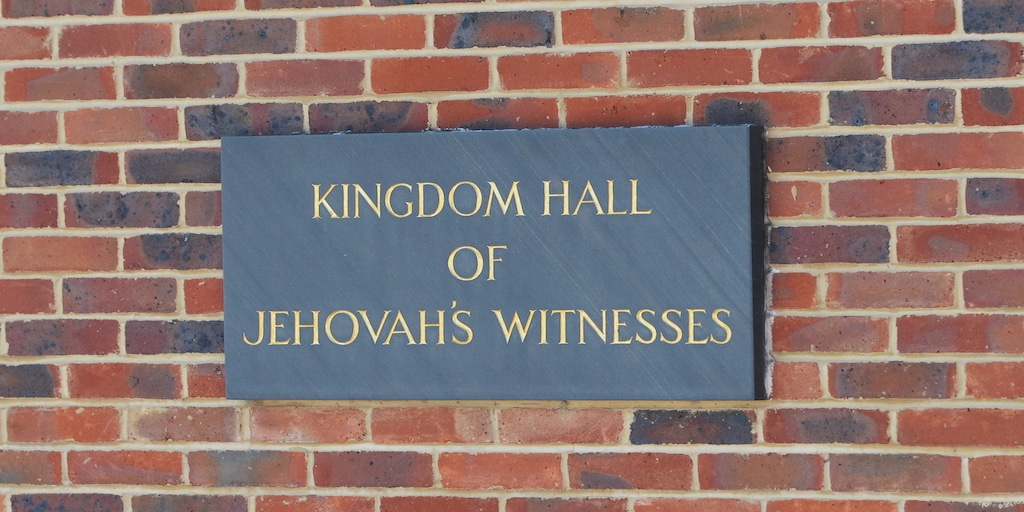Jehovah’s Witnesses and the Divine Name “Jehovah”

The name, Jehovah, is God’s one and only true name, according to the Watchtower Society. Jehovah’s Witnesses claim that the sacred name was removed from the Bible by superstitious Jewish scribes a long time ago. However, the Watchtower says there is no cause for concern. They claim that their New World Translation of the Holy Scriptures has faithfully restored the divine name in the Old Testament whenever the Hebrew consonants “YHWH” are present.
Moreover, the Watchtower New World Bible Translation Committee has inserted the name Jehovah into the New Testament, specifically in verses believed to refer to the Father. Despite contradicting the thousands of Greek manuscripts of the New Testament, some dating back to the second century, they took the liberty to do so.
When a Jehovah’s Witness knocks on your door, they often emphasize the importance of using God’s true name, Jehovah. They may open their New World Translation and reference Exodus 3:15, which states that Jehovah is God’s name “to time indefinite.” Another verse they commonly cite is Romans 10:13—“Everyone who calls on the name of Jehovah will be saved.” By quoting such passages, Jehovah’s Witnesses often persuade those who are unsuspecting or unfamiliar with the Bible that correctly using God’s “true” name (Jehovah) is absolutely crucial for salvation.
Jehovah’s Witnesses firmly believe that they are the true followers of God, uniquely distinguished by their unwavering insistence on using His “true” name, Jehovah. In their view, all other Christian denominations are part of a misguided and devilish Christendom.
A Biblical Response to the Jehovah’s Witnesses View
A look at the biblical evidence shows the Watchtower viewpoint on God’s name to be untenable. Foundationally, the word “Jehovah” is a manmade term. This name cannot be found in the Hebrew and Greek manuscripts that serve as the basis for English Bible translations. In reality, the Old Testament features the name Yahweh, or more accurately, YHWH, as it was originally written using only consonants.
Where did the term “Jehovah” originate? To find the answer, we need to understand that ancient Jews had a deep apprehension of pronouncing the name YHWH. They believed that speaking this name could potentially violate the Third Commandment, which forbids taking God’s name in vain (Exodus 20:7). To ensure they did not break this commandment, the Jews substituted the name Adonai (Lord) or another term whenever they encountered YHWH during public readings of Scripture.
Eventually, the fearful Hebrew scribes decided to insert the vowels from Adonai (a-o-a) within the consonants, YHWH. The result was Yahowah, or Jehovah. Therefore, Jehovah is a term that originates from a combination of consonants and vowels derived from YHWH and Adonai. Watchtower literature acknowledges this fact.
The point, then, is that the term Jehovah is not actually a biblical term. It is a manmade term. Of course, there are other translations besides the New World Translation that have used the term “Jehovah.” The American Standard Version (1901) consistently uses the term. The King James Version uses the term in four instances only (Exodus 6:3; Psalm 83:18; Isaiah 12:2; 26:4). The New English Bible also uses Jehovah in Exodus 3:15 and 6:3. Jehovah’s Witnesses often impress people by pointing to such verses where the name “Jehovah” is used in these translations. It gives the appearance that the Witnesses are right in saying that God’s only true name is Jehovah.
Though the term Jehovah is not justified biblically, it is important to note that scholars are still uncertain about the correct pronunciation of the Hebrew word YHWH. While Yahweh is generally accepted as the accurate rendering (which I personally believe as well), we should not criticize the Jehovah’s Witnesses for using the term Jehovah in the Old Testament where the Hebrew consonants YHWH appear (though they can definitely be criticized for inserting this name in the New Testament). After all, some legitimate Bible translations also use the term Jehovah in the Old Testament.
Because the term Jehovah has become widely accepted as a way to refer to God, our main concern with the Jehovah’s Witnesses shouldn’t be the term itself, but rather how they interpret and understand this term in their theology. The truth is, “Jehovah” is not the only name by which God is known. Contrary to what the Jehovah’s Witnesses claim, Scripture identifies God in various other ways besides the name Jehovah. One example is when He is referred to as “the God of Abraham, God of Isaac, and God of Jacob”—a phrase that appears frequently in Scripture. This clearly demonstrates that while God is certainly known as Jehovah (or Yahweh, to be more accurate), He is not exclusively known by this name.
God is also known in the Bible by the name El Shaddai. In Hebrew, “El” means “Mighty God.” However, “Shaddai” adds depth and meaning to this title (Genesis 17:1-20). Many scholars suggest that “Shaddai” is derived from a word associated with a mother’s nurturing breast. Hence, this name not only portrays God as a Mighty God, but also reveals His abundant compassion, grace, and mercy.
Significantly, Jesus never referred to God the Father as “Jehovah” in the New Testament. If the Jehovah’s Witnesses are correct in saying that God must always be referenced by the name Jehovah, then Jesus was way out of line, for He never used this name of the Father. The New World Translation sometimes puts the word “Jehovah” in Jesus’ mouth in the New Testament, but they do so in direct violation of the thousands of Greek manuscripts that we have.
Scripture reveals that as God’s children, we have a unique privilege to approach the Father and speak to Him intimately, calling Him “Abba! Father” (“Abba” loosely means “daddy”—Romans 8:15; Galatians 4:6). This means that we shouldn’t interpret Exodus 3:15 rigidly, believing that “Jehovah” is the only way to address God. In the context of Exodus 3:15, the main message is that people of every generation will come to know and understand God’s true nature and His role as the eternal, self-existent and sovereign Lord of the universe. The name “Jehovah” signifies this revelation about God.
Jehovah’s Witnesses are also incorrect in their assertion that salvation is dependent on adherence to the name “Jehovah.” According to the New World Translation, Romans 10:13 states, “Everyone who calls on the name of Jehovah will be saved.” Jehovah’s Witnesses argue that the correct use of God’s name, Jehovah, is essential for salvation. However, this assertion is flawed.
The New World Translation mistranslates this verse. The original Greek text does not mention “Jehovah.” The Watchtower Society’s translators added this word into the text. The verse should be correctly translated: “Everyone who calls on the name of the Lord [Greek: Kurios] will be saved” (ESV, insert added). Considering the broader context of the passage, it becomes evident that it is referring to the Lord Jesus Christ. Therefore, our salvation is based on calling upon Jesus Christ.
Let me be clear, the New Testament consistently exalts Jesus. The Watchtower Society’s intentional insertion of “Jehovah” throughout the New Testament is merely an effort to obscure the truth. The truth is that the name the New Testament continuously exalts is Jesus.
Here are some important questions that can be posed to a Jehovah’s Witness to showcase the exalted position of Jesus in the New Testament:
- In whose name should we meet together (Matthew 18:20; 1 Corinthians 5:4)?
- Demons are subject to whose name (Luke 10:17; Acts 16:18; 17:18)?
- Repentance and forgiveness should be preached in whose name (Luke 24:47)?
- In whose name are you to believe and receive the forgiveness of sins (John 1:12; 3:16; Acts 10:43; 1 John 3:23; 5:13)?
- By whose name, and no other, do we obtain salvation (Acts 4:12)?
- Whose name should be invoked as we bring our petitions to God in prayer (John 14:13, 14; 15:16; 16:23, 24)?
- In whose name is the Holy Spirit sent (John 14:26)?
- Whose name and authority was invoked by the disciples in healing the sick and lame (Acts 3:16; 4:7-10, 30)?
- Whose name did Paul tell us to call upon (1 Corinthians 1:2)?
- Whose name is above every name (Ephesians 1:21; Philippians 2:9-11)?
The answer to all of these questions is unequivocally Jesus. Take some time to consult these verses. Jesus is not only at the heart and center of the New Testament but also the Old Testament. In fact, Jesus Himself claimed on five separate occasions to be the central theme of the entire Old Testament: (1) Matthew 5:17; (2) Luke 24:27; (3) Luke 24:44; (4) John 5:39; and (5) Hebrews 10:7. With Christ as the focal point of the Old Testament, the connection between the Old and New Testaments is inseparably linked in the person of Jesus Christ.
As is true of all other doctrines, I urge Christians to test all Watchtower claims against Scripture (Acts 17:11; 1 Thessalonians 5:21). Let us not forget that the Scriptures are our barometer of truth.
~ ~ ~
If you’re seeking a comprehensive treatment on this subject, I invite you to dive into my 464-page book titled, Reasoning from the Scriptures with the Jehovah’s Witnesses (published by Harvest House).







